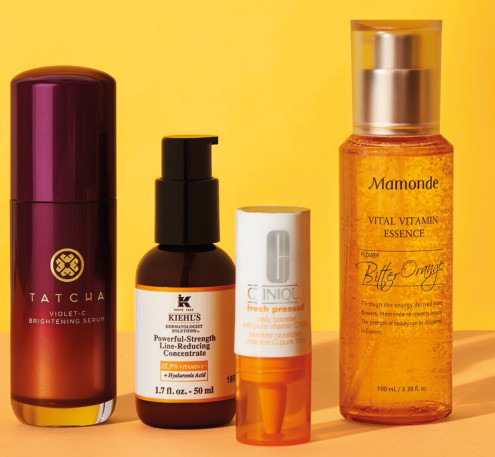Is vitamin C really the miracle ingredient when it comes to anti-ageing?


The Sunday Riley C.E.O. GLOW, $56 (15 ml), combines THD ascorbate with turmeric and ultra-nourishing oils to brighten and hydrate skin.
The This Works Morning Expert Hyaluronic Serum, $65 (30 ml), replenishes lost moisture with hyaluronic acid and charges the skin with vitamin C to protect it against free radical damage during the day.
Containing vitamin C extracted from Murunga Plum, which is 100 times more concentrated than oranges, the Dior Capture Youth Glow Booster AgeDelay Illuminating Serum, $152 (30 ml), brightens and protects skin with its lightweight, non-sticky texture.
With a formulation containing vitamin C at a 15 per cent concentration, the Vichy Vitamin C Freshshot LIFTACTIV, $52 (10 ml), improves skin texture and radiance over time.
Containing tetrahexyldecyl ascorbate (THD ascorbate), a type of stabilised vitamin C, the Peter Thomas Roth Potent-C Targeted Spot Brightener, $94 (15 ml), helps reduce the appearance of pigmentation.

Why you need to add this well-rounded ingredient to your skincare routine, stat
It’s not uncommon to turn to some vitamin C pills whenever you’re feeling under the weather, and contrary to popular belief they don’t necessarily prevent or cure colds. Instead, vitamin C is a powerful antioxidant that can neutralise free radical damage which bombards our cells on a daily basis. It’s also worth noting that our bodies are incapable of producing its own vitamin C (Fun fact: The only other animal species which is unable to do so are guinea pigs!), which makes its intake all the more important.
What’s an antioxidant?
Free radicals are highly reactive molecules with missing electrons, making them very unstable. In order to neutralise this imbalance, free radicals would retrieve electrons from healthy skin cells, oxidising them and making them prone to damage. What antioxidants do is readily give up their electrons, thus protecting cells from being oxidised. Free radicals aren’t all bad – it’s a byproduct of the body’s natural metabolic functions and our immune system actually uses it to kill off bacteria which tries to infect us. The key is to always maintain a healthy balance, and avoid excessive exposure to free radicals which can come in the form of cigarette smoke, pollution and ultraviolet radiation.
Why use it on skin?
Before you reach out for some oranges, know that when vitamin C is consumed, the vital organs will have priority when it comes to distributing it throughout the body, and skin is not considered a vital organ in this case so only trace amounts of consumed vitamin C will reach the skin eventually. Topical application of vitamin C will ensure that the skin gets first dibs on the benefits which it offers.
Besides combating environmental aggressors like smog and pollution, vitamin C is also known for many skin benefits. It’s responsible for kick-starting the amino-acid chain in the fibroblasts cells, which produces collagen fibres. This helps to firm up the skin, as well as reduce the appearance of fine lines and wrinkles.
Vitamin C can also impede the production of melanin, which can be beneficial in fading scars, pigmentation, dark spots and sun damage.
It’s unstable
Even though vitamin C offers a myriad of benefits, pure vitamin C (in the form of ascorbic acid) is also a very volatile ingredient. Serums and moisturisers containing the unstable form of vitamin C are often found in dark or opaque packaging and are airtight to prevent oxidation. There are also products which require you to finish them within a certain amount of time, when it’s the most efficacious.
However, skincare technology has improved over the years and vitamin C derivatives like sodium ascorbyl phosphate, ascorbyl palmitate, tetrahexyldecyl ascorbate, magnesium ascorbyl phosphate or ascorbyl glucoside are highly stabilised, which means they can be found even in clear bottles and jars that can be used for an extended period of time.
Time to rise and shine
The best time to use vitamin C is actually in the morning as it shines in its ability to protect the skin against environmental aggressors, and when the likelihood of free radical damage is the highest. Applying vitamin C at night isn’t actually detrimental to the skin, but it is certainly more useful in the day.
Not your spider senses tingling
As vitamin C is an active ingredient, you may end up with a slight tingling sensation after application, which is pretty common. If you have sensitive skin, always start with serums with a lower vitamin C concentration and then work your way up to avoid irritation. As vitamin C products work best in the day, it’s also important to follow up with a sunscreen for optimal protection.
From left: Tatcha Violet-C Brightening Serum, $136 (30 ml). Kiehl’s Powerful Strength Line-Reducing Serum 12.5%, $105 (50 ml). Clinique Fresh Pressed Daily Booster with Pure Vitamin C 10%, $99 (4 x 8.5 ml). Mamonde Vital Vitamin Essence, $45 (100 ml). PIXI Vitamin Wakeup Mist, $22 (80 ml). Allies of Skin Vitamin C 35% Rebuilding Serum, $185 (30 ml). Drunk Elephant C-Firma Day Serum, $114 (40 ml). Skin Inc Vitamin C Serum, $68 (10 ml). The Body Shop Vitamin C Skin Reviver, $41 (30 ml).

TEXT: ARISSA HA / STYLING: XU MEI YAN / PHOTOS: PHYLLICIA WANG























